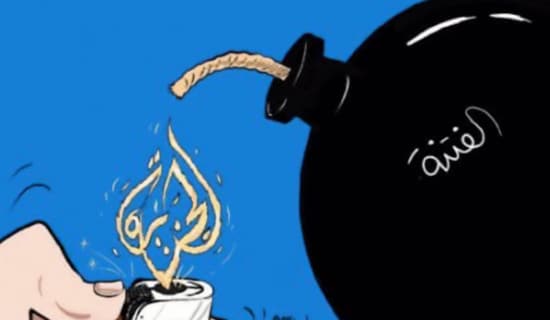Introduction
As the year 2024 began, the Tehreek-e-Taliban Pakistan (the Movement of the Pakistani Taliban, TTP) appeared intent at creating – militarily, ideologically, strategically – a mini emirate in Pakistan's Khyber Pakhtunkhwa, the province now incorporating South and North Waziristan and other tribal districts, the TTP's traditional strongholds. Whereas, the Islamic Emirate of Afghanistan (IEA, i.e., the Afghan Taliban), the ideological jihadi cousins of TTP, continued to rebuff the global demand to reverse their order banning girls and women from attending schools from the sixth grade onward and colleges and universities, or from working.
If the TTP strategy were to succeed, a mini emirate could play a dire role between Pakistan and Afghanistan, much like the Kashmir issue keeps Pakistan and India in a continual mode of war. Kashmir has brought the two nuclear states to war multiple times, much like the post-August 2021 issues in Khyber Pakhtunkhwa and surrounding areas have already pushed Afghanistan and Pakistan to war many times and inevitably to peace talks without result.
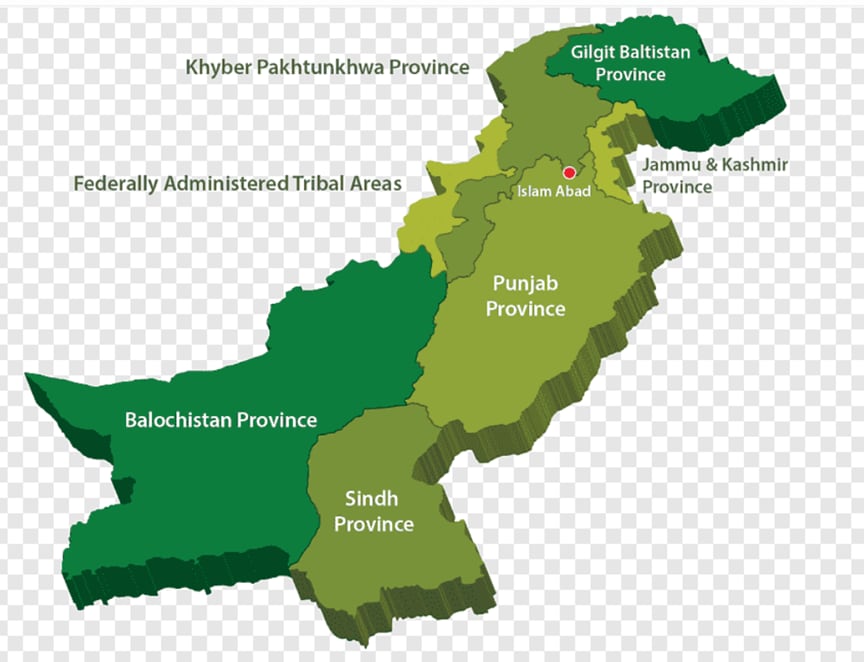
Federally Administered Tribal Areas (FATAs) are now absorbed into Khyber Pakhtunkhwa province, which seems to be at the receiving end of TTP attacks (image courtesy: pngegg.com)
After the IEA took control of Afghanistan on August 15, 2021, Pakistani newspapers and military leaders were jubilant.[1] On September 4-5, just days after the last American soldier left Kabul on August 31, Lt.-Gen. Faiz Hameed, the chief of the Pakistani military's Inter-Services Intelligence (ISI), paid a triumphant visit to Kabul, viewing the Taliban rulers as puppets, to arrange the formation of the IEA government to Pakistan's liking. Asked about the emerging lawlessness in the region, the ISI chief told a journalist in Kabul, "everything will be okay."[2] But as of early March 2024, nothing is okay.
Developments in international politics have intended and unintended consequences. Along with the joyous Pakistani leaders, the TTP, which had been waging war against the state of Pakistan in the border region, was also enchanted with the defeat of the American military colossus by its ideological jihadi brothers in Afghanistan.
And within weeks, by mid-December 2021, TTP emir Mufti Noor Wali Mehsud formally declared that his organization was "a branch of the Islamic Emirate of Afghanistan."[3] This was not new, as the TTP and Al-Qaeda leaders have always offered bay'a ("oath of allegiance") to the emir of the IEA, a position now held by Mullah Hibbatullah Akhundzada.
The TTP-Afghan Taliban-Al-Qaeda Machine
The annual report of the UN Monitoring Committee, released in May 2022, stated that the TTP constituted "the largest component of foreign terrorist fighters," adding: "TTP has arguably benefitted the most of all the foreign extremist groups in Afghanistan from the Taliban takeover. It has conducted numerous attacks and operations in Pakistan.
"The TTP also continues to exist as a stand-alone force, rather than feeling pressure to merge its fighters into Afghan Taliban units, as is the prospect for most foreign terrorist fighters. The group is estimated to consist of 3,000 to 4,000 armed fighters located along the east and south-east Afghanistan-Pakistan border."[4]
A year later, the UN Monitoring Committee Report, released on June 1, 2023, reiterated the no-new fact that the Afghan Taliban "have harbored and allowed active support of TTP" and reported: "Al-Qaeda members trained and supplied ideological guidance to TTP fighters in suicide bomber training camps in Kunar province."[5]
The 2023 UN report also noted that "the estimated strength of TTP in Afghanistan is 4,000 to 6,000 fighters, based mainly in the eastern provinces of Nangarhar, Kunar, Logar, Paktika, Paktia and Khost. Its leader, Mufti Noor Wali Mehsud, and deputy Qari Amjad Ali are based in Paktika and Kunar provinces, respectively."[6] The 2023 figures showed a growth of 2,000 fighters in the ranks of the TTP.
Supported by Al-Qaeda and the ruling IEA, TTP stepped up its terror attacks aimed at creating an Afghanistan-like emirate in Khyber Pakhtunkhwa and its surrounding areas, as a steppingstone to the enforcement of Islamic shari'a governance in Pakistan. During 2022 when the IEA was in full power throughout the year, the TTP carried out 367 terror attacks in Pakistan.
According to its annual report released in January 2023, TTP killed 446 Pakistani security personnel and wounded 569 in these attacks, which included 348 attacks in Khyber Pakhtunkhwa, 12 in the restive Baluchistan province, five in Punjab and two in Sindh.[7]
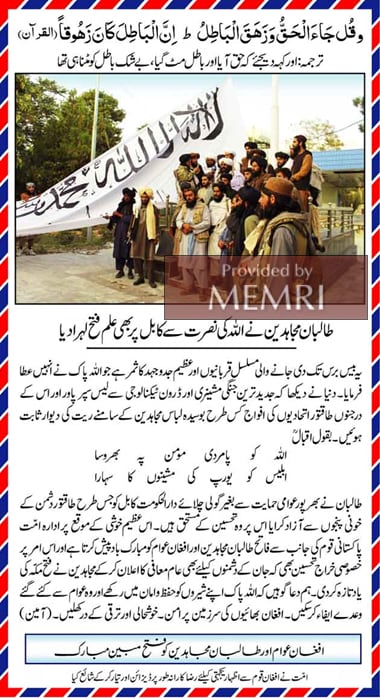
A day after Afghan Taliban seized power in Kabul, Urdu daily Roznama Ummat published an advertisement, titled "Taliban mujahideen, with Allah's aid, unfurled victory flag on Kabul too," on the victory of Afghan Taliban in Kabul "to express solidarity with the Afghan nation."
With the IEA in power in Kabul for over 16 months, December 2022 then proved to be the deadliest month for Pakistan for the first time in a decade, noted the annual security report published by an Islamabad-based research institute, which put the number of slain Pakistani security personnel at 282, with 40 dead in December alone, less than 446 claimed by the TTP.[8] However, its data also included terror attacks by non-TTP groups such as those in Baluchistan.
In its annual report for 2023, a year later, the TTP claimed to have executed a total of 881 terror attacks in Pakistan, revealing a sharp rise from 367 attacks in 2022. The year 2023 was alarming for Pakistani military, as the TTP annual report indicated that its attacks resulted in the casualties of 2,193 members of Pakistani security forces.[9]
This report also noted that 23 members of Pakistani security forces were captured, while some of them were released subsequently following mediation by local tribal elders.[10] The TTP report for 2023 gives further break-up, noting that out of 2,193 casualties, 977 Pakistani security personnel were killed and 1,216 were wounded during the year.[11]
In its annual security report for 2023, The Centre for Research & Security Studies of Pakistan, reporting figures close to the TTP's claims, noted a six-year high of a 56 percent surge in violence during the year. It stated: "In 2023, Pakistan witnessed 1,524 violence-related fatalities and 1,463 injuries from as many as 789 terror attacks and counter-terror operations. This includes nearly 1,000 fatalities among civilians and security forces personnel.
"The overall fatalities including those of outlaws [i.e., terrorists] mark a record 6-year high, exceeding the 2018 level and highest since 2017. Moreover, the country saw a surge in violence for the third consecutive year with an uptick recorded each year beginning from 2021."[12] Not surprisingly, Khyber Pakhtunkhwa and Baluchistan provinces have borne most of the attacks by the TTP Since the Afghan Taliban took control of power in Afghanistan in mid-August 2021.
The CRSS report for 2023, also taking into account the attacks by the Baluchi groups fighting for the independence of Baluchistan, noted that Khyber Pakhtunkhwa and Baluchistan "were the primary centers of violence, accounting for over 90 percent of all fatalities and 84 percent of attacks (including incidents of terrorism and security forces operations) recorded during this period. Punjab and Sindh were relatively peaceful as together, both these provinces suffered only 8 percent of all fatalities in 2023."[13]
The TTP Emir's Six-Point Strategy
Mufti Noor Wali Mehsud aka Mufti Abu Mansur Asim took over as the emir of the TTP in June 2018 after then emir Maulana Fazlullah was killed in a U.S. drone strike in Afghanistan.[14] Among the first decisions he made was to unite all jihadi commanders operating autonomously in the Pakistani tribal regions of North and South Waziristan and in other parts of Khyber Pakhtunkhwa province.
By the middle of 2023, Mufti Noor Wali Mehsud had expanded TTP's organizational network to include more than two dozen jihadi commanders, each along with their fighters, into the TTP ranks.[15] A key requirement for the jihadi commanders was to offer bay'a to the principles of jihad and hijra ("migration") at the hand of the TTP emir, thereby accepting Mufti Noor Wali Mehsud as emir and vowing to wage jihad and if necessary to migrate for the sake of waging jihad at the command of the emir.[16]
While the amalgamation of small jihadi outfits into the umbrella network of the TTP was the first strategy, the second strategy adopted by Mufti Noor Wali Mehsud was the creation of a more robust and devolved organizational network. Unlike in the past when TTP had been centrally administered, Mufti Noor Wali Mehsud embarked on expanding the organization on a path of decentralization, which gave each militant commander some definitive say in how the organization was being run.
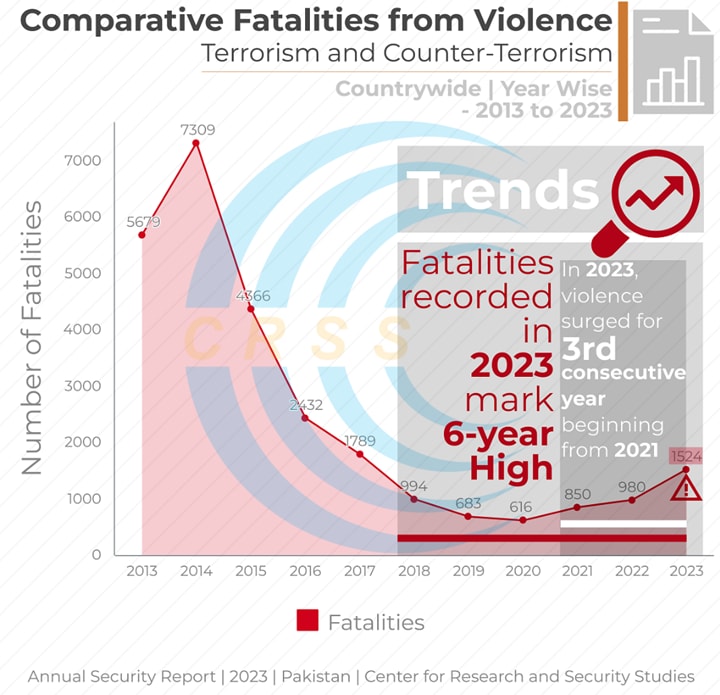
In January 2024, Pakistan's Centre for Research & Security Studies (CRSS) noted a six-year high in attacks in Pakistan.
In February 2022, just six months after the rise of the IEA to power in Kabul, TTP copied the Afghan Taliban's organizational structure and divided the region of Khyber Pakhtunkhwa into the following seven wilayahs (provinces): Bannu wilayah, Kohat wilayah, Dera Ismail Khan wilayah, Malakand wilayah, Peshawar wilayah, Mardan wilayah, and Hazara wilayah.[17]
The TTP also appointed governors and deputy governors for these wilayahs and named chiefs of intelligence for various regions. As part of the organizational restructuring and expansion, Maulvi Noorullah Mehsud was appointed as head of the Military Commission (Northern Zone) with Bilal Ghazi as administrative chief; whereas Mufti Burjan Swati was named the head of the Military Commission (Southern Zone) with Muneeb as administrative head.[18]
By early 2024, the TTP's organizational structure comprised of a total of 12 wilayahs, including one each for Makran and Kalat in Baluchistan, wilayahs for Southern Punjab and North Punjab, and one wilayah for Gilgit Baltistan.[19] In doing so, TTP was inspired by IEA, and aimed to follow the latter's strategy of creating a structure of government that will take over in this wider region whenever an opportunity arose.
Concerned over the TTP's expansion, a Pakistani analyst warned: "These emerging trends of terrorism will only add to Pakistan's persistent security challenge in terms of Taliban militancy in Khyber Pakhtunkhwa and the erstwhile Tribal Areas [now absorbed into Khyber Pakhtunkhwa province] and the Baluchi nationalist insurgency in Baluchistan. Extended over a longer period, such an environment of insecurity, militancy, and violence can also pose serious threats to [Pakistan's] political and economic stability."[20]
It is not that the addition of Punjab was something new. Islamic religious seminaries based in Punjab have always been centers of radicalization. In August 2013, TTP broadcasting arm Umar Media released a video of Maulana Asmat Muawiya, the emir of a TTP offshoot known as Tehreek-e-Taliban Punjab, in which he urged youths to replicate the Benghazi attack by destroying European embassies in Pakistan, India, Bangladesh, and so on.[21]
The third strategy adopted by the TTP emir was to shun the path of targeting civilians, much like the Afghan Taliban had done during their jihad against the U.S. and NATO troops in Afghanistan. Consequently, the TTP fighters have been carrying out a continuing series of terror attacks on Pakistani army posts and forts, or security checkpoints manned by the personnel of the Frontier Corps (FC) and Levies, the paramilitary forces, as well as police in the Pakistani border region.[22]
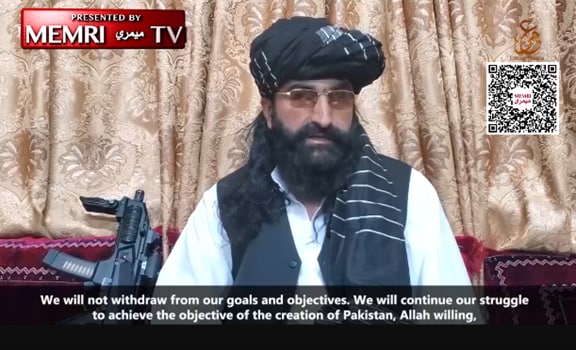
Mufti Noor Wali Mehsud succeeded Mullah Fazlullah in June 2018 as emir of TTP
The fourth point of TTP's strategy emerged in a statement it issued on September 28, 2023. Veer Bhan, a Hindu and former member of the township council in Dera Ismail Khan district of Khyber Pakhtunkhwa province, was kidnapped. The TTP admitted its fighters mistakenly took him away, and explained further that in the ongoing jihad, there have been occasional instances where non-Muslim minorities such as Hindus, Sikhs, Christians, and others are targeted due to a lack of awareness among the mujahideen.[23]
According to the statement, the TTP ordered the release of Veer Bhan and emphasized that the TTP mujahideen's primary targets are the Pakistani military and police. The TTP statement also cited shari'a interpretations by South Asian Islamic scholars, especially by Maulana Muhammad Ashraf Ali Thanvi, regarding the status of non-Muslim minorities, noting two grounds for mujahideen not to act against religious minorities: i) when religious minorities "have been living with Muslims for a long time and are living contentedly with each other" – in other words – in "a form of practical [social] contract"; and ii) when religious minorities do not "play a role against the mujahideen in the ongoing war in support of the security agencies."[24]
The TTP's fifth strategy was clearly inspired by some points that emerged during the Doha negotiations between IEA and the United States, which resulted in the signing of a deal on February 29, 2020, requiring that the Afghan Taliban will not allow terror threats from their territory against the U.S. and its allies. In a move aimed at potentially avoiding American action, the TTP declared that its jihad has no agenda outside Pakistan.
In a statement dated February 7, 2023, which also sought to reject Pakistan's criticism that the Afghan Taliban government in Kabul was allowing the TTP fighters to use its soil to launch attacks into Pakistan, the TTP stated, among other points, that: "Tehreek-e-Taliban Pakistan has no external and global agenda. Our holy war is against the treacherous and occupying forces of Pakistan"; "we are fighting our holy war from our own land with the support of our brave and independent nation. We do not need to use the land of any neighboring country, including Afghanistan"; "a large number of mujahideen from Pakistan are engaged in Jihad-e-Pakistan. There is no need for mujahideen from other regions except Pakistan to come and participate."[25]
However, the claim that TTP has no "external and global agenda" appeared to be purely tactical, and as examined below, the Pakistani jihadi organization remains committed to global jihad, like other jihad-inspired groups. The global contours of its ideology of jihad go much beyond Pakistan to India and Jerusalem.
The sixth point in the TTP's strategy also crystallized during the Doha negotiations process in Qatar. The IEA leaders, who were negotiating with American delegation led by Zalmay Khalilzad in Doha, had stressed that the Taliban mujahideen would continue to fight the U.S. and NATO forces. The IEA stated clearly that the U.S. "should forget about the idea of us putting down our arms."[26] The TTP copied this strategy, thinking that it could also fight Pakistani armed forces while simultaneously holding peace talks.
The TTP's Strategy Of Fighting And Talks
During 2021-2023, the mounting terror attacks by TTP in Khyber Pakhtunkhwa and Baluchistan imperilled bilateral relations between Pakistan and Afghanistan, forcing Pakistan to launch a coercive policy against the IEA. Right through this period, and also before the Taliban captured power in August 2021, Pakistan had launched missile attacks and cross-border raids inside Afghanistan, targeting TTP hideouts in 2014,[27] 2017,[28] 2021,[29] 2022,[30] and 2023.[31]
What was different after August 2021 was that the Afghan Taliban, viewed as the puppets of Pakistani military, were expected to act and eliminate the TTP. But the TTP had continued with its policy of fighting Pakistani security forces, while Afghan Taliban were finding it difficult to rein them in because TTP foot soldiers had always fought for the Afghans. Within weeks of being in power, the Afghan Taliban began mediation between the TTP and Pakistan.
Reports about the negotiations, initially kept secret, made way to the media after the jihadi organization issued a statement on November 10, 2021. The TTP statement noted: "This is a reality that negotiations are part of war and no power in the world can reject this. Therefore, the TTP is ready for such negotiations which can lead to the establishment of lasting peace in the country; and on the one hand our Pakistanis can reap the springs of peace and on the other hand the objective of the achievement of [the creation in 1947 of] Pakistan can also be realized [i.e., to create a country in the name of Islam]."[32]
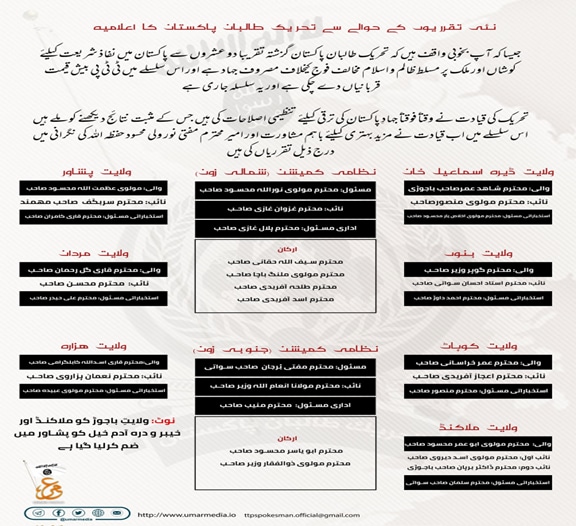
In February 2022, the TTP emir established a parallel government, a blueprint for an emirate, in the border region, creating seven wilayahs (provinces) and appointing governors
The TTP's statement of November 10, 2021, also declared a month-long ceasefire from November 9 to December 9, 2021. Issued by TTP spokesman Muhammad Khurasani, the statement noted that: The parties have agreed on the formation of negotiating committees; the Parties will observe ceasefire for one month from November 9 to December 9 which can be renewed; it is incumbent upon the parties to adhere to the ceasefire; and the IEA is playing the role of mediator.[33]
On December 9, 2021, Muhammad Khurasani issued a long statement declaring that it was not possible to continue the ceasefire.[34] This statement, however, also revealed that the ceasefire agreement had been reached between the two parties on October 25, 2021, and Pakistan had agreed to release 102 TTP leaders.[35] It accused the Pakistani military of multiple violations, noting: "TTP abided by the ceasefire whereas the Pakistani security institutions carried out raids during the ceasefire at Gandapur, Lakki Marwat, Swat, Bajaur, Dir, and Swabi."[36]
While simultaneously engaged in peace talks, the TTP was pursuing the tactic it had learned from the IEA during the Doha peace process, i.e., to talk but keep fighting. Amid the talks, TTP Emir Mufti Noor Wali Mehsud issued a separate statement saying his organization will not surrender weapons and vowed again to wage jihad against Pakistan. It appears that three major obstacles that had emerged during the ceasefire period were: Pakistan's refusal to release some TTP leaders who had been responsible for high-profile terror attacks, the TTP's refusal to surrender its weapons, and Pakistan's demand that TTP accept the Pakistani constitution instead of shari'a.
Mufti Noor Wali Mehsud clarified: "We never declared an unconditional ceasefire. Rather, it was decided in talks between us and the Pakistani military leadership that the army will release 102 of our associates, including Mahmood Khan and Haji Muslim Khan [Swat Taliban commanders], who had been arrested on the pretext of talks. However, the army, repeating their old habit, did not release them."[37]
The TTP emir added: "Our jihad is according to shari'a and started in light of fatwas of the Ulema [Islamic scholars] of the current era. We will remain armed until the shari'a allows us to be armed. As far as the constitution is concerned, we accept articles of the constitutions that are according to shari'a. However, those in conflict with shari'a are not acceptable to us."[38]
However, Mufti Noor Wali Mehsud's statement – issued in audio and published on TTP's website on December 10, 2021 – was more significant for the fact that the TTP was inspired by the tactics used by the Afghan Taliban during negotiations with the United States in Doha, the capital of Qatar. The TTP emir said: "The Islamic Emirate, while continuing jihad, also adopted the path of talks [with the United States in Doha, Qatar]... we also adopted this path. If we achieve our aim this way, it is well and good. Otherwise, the jihad already continues."[39]
In January 2022, TTP spokesman Muhammad Khurasani stated bluntly that the TTP is ready simultaneously for war and talks. Khurasani said: "We want to make it clear to the people of Pakistan once again that we are ready for both war and talks. Our military and political strength is greater than ever before, and we can never be broken by the enemy's misrepresentations and disrupting statements. Allah willing!"[40]
While the TTP, ready with a structure of parallel government for Khyber Pakhtunkhwa and its surrounding regions, continued to fight and remained ready for talks, the Pakistani military was also executing security operations while holding talks with the TTP officially and unofficially. The 2022 talks ultimately failed, with both sides responsible.
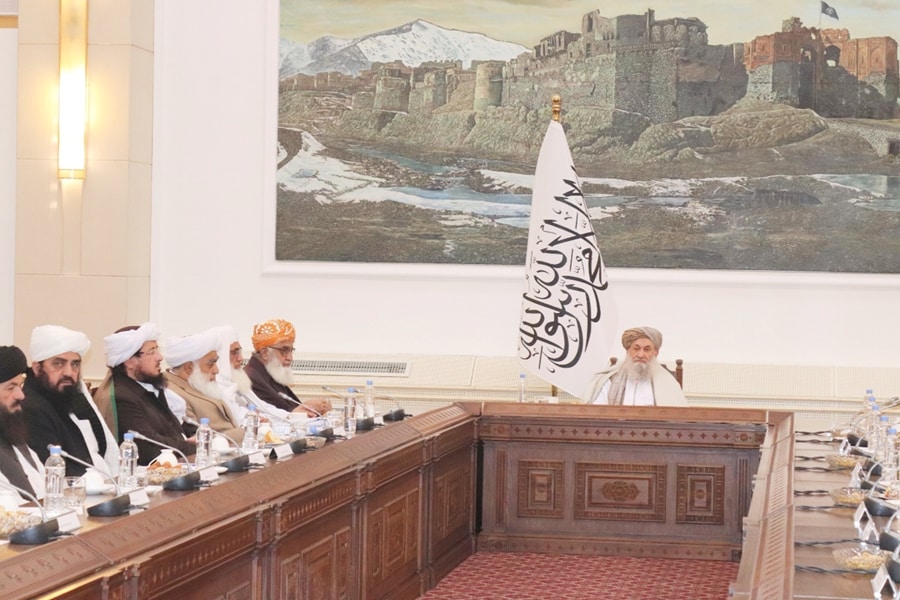
Maulana Fazlur Rehman (sixth from left, wearing an orange turban) holds talks with Afghan Taliban Prime Minister Mullah Muhammad Hasan Akhund in Kabul on January 8, 2024
The TTP's attacks against Pakistani armed forces also continued. In the next year, some major attacks by TTP must be mentioned: the July 12, 2023, an attack on Zhob military garrison in Baluchistan, killing a dozen Pakistani soldiers;[41] the November 4, 2023, the attack at the Mianwali base of the Pakistan Air Force,[42] and the December 12, 2023, attack on a military post near Daraban in Dera Ismail Khan district of Khyber Pakhtunkhwa province in which at least 66 soldiers and paramilitary personnel died.[43] These attacks were claimed by Tehreek-e-Jihad Pakistan (TJP), but it is believed that the TTP executed the attacks, while shifting the blame on TJP, a group created newly for this purpose.
It is amid this context that the Pakistani government, at the behest of the Pakistani military, ordered the expulsion of the Afghan refugees who had settled in Pakistan since the 1980s. The expulsion began on November 1, 2023, forcibly displacing 1.7 million Afghan refugees, a human tragedy of colossal proportions not seen since 1947, when millions were displaced and killed as Pakistan was carved out of India.
Amid global silence, journalist Habib Khan posted a video of Pakistani bulldozers razing the homes of the Afghan refugees along with a tweet: "The Pakistani government destroying homes of Afghan refugees. If only Pakistan were a Jewish state, there would have been a global outcry from anti-Jews Muslims and liberals. Now, it does not fit their narrative so who cares about the plight of millions of Afghan refugees?"[44]
The Afghan Taliban Thwart Global Pressure
In addition to coming under the pressure of Pakistan's coercive policy, the IEA has consistently tried to ignore global pressure regarding two major issues: one, a demand to reverse its ban on girls and women from entering schools, colleges, universities, workplaces, parks and other public places; two, a demand by the United Nations and other international powers to form an inclusive government by including opposition politicians, community elders, and women, in order for IEA government to be recognized.
The IEA took control of Afghanistan on August 15, 2021. It established an interim government on September 7, 2021. One of that government's first decisions was to abolish the Ministry of Women's Affairs, replacing it with the Ministry of Promotion of Virtue and Prevention of Vice.[45] In addition to the ministries of education and higher education, which banned schools and colleges for females, this ministry has implemented an extensive series of measures that have pushed women within the four walls of their homes, namely, women cannot: travel without a mehram (i.e., a close male relative); use phones equipped with a camera; be seen without a hijab; visit beauty parlors or parks; or work in offices, among other restrictions.[46]
On the issue of the women's education, the Afghan Taliban government has rejected every attempt by Muslim leaders as well as Western governments to lift their ban on girls' schooling. The Taliban's Minister for Higher Education Neda Mohammad Nadeem has even justified the ban on schools and requirements for the hijab, saying: "Allah's religion does not allow us to accept what those unbelievers want. The headscarf is commanded by Allah's book. 'O Prophet, tell your wives and daughters and the believers' women to veil themselves.' This is commanded by Allah's book."[47] However, the Taliban rulers do indicate that they will establish separate religious schools for girls in coming years, constituting a segregated system of education.
The second point on which the Taliban government has consistently withstood pressure from the UN and Western governments is the demand for an inclusive government, i.e. by including opposition politicians, ethnic and community leaders, and female leaders. The demand for an inclusive government is not only from the West, but also from Iran, Pakistan, Tajikistan, and other Islamic countries.[48] In December 2023, former mujahideen commander and leader of Hizb-e-Islami Afghanistan, Gulbuddin Hekmatyar, said the U.S. has accelerated its demand for an inclusive government, presenting a list of leaders to be included in the Taliban cabinet.[49]
But the Taliban leaders have repeatedly rebuffed such demands for inclusive government. In November 2023, Afghan Taliban spokesman Zabihullah Mujahid said the current system of Afghanistan is already inclusive and the people of all provinces and representatives of tribes participate in it.[50] He added that 80 percent of the previous republican system is in place and those who want to bring experienced politicians to power in the name of inclusive government in Afghanistan have their own political goals.[51]
On December 10, Zabihullah Mujahid rejected an Iranian demand for an inclusive government, saying that the neighboring countries must not interfere, and the issue of inclusive government is "an internal issue" of Afghanistan.[52] A week later, Tolo News quoted Zabihullah Mujahid as saying the United Nations does not have a specific definition of an inclusive government in Afghanistan.[53] The IEA has also rejected all international pressure regarding its suppression of journalists and women's rights activists and political opponents, and is likely to continue on a totalitarian path in coming years.
Maulana Fazlur Rehman's Mediation Efforts
By early 2024, Pakistan and Afghanistan were back at the negotiating table. Confronted by a tough stance adopted by Pakistan, especially since its decision to expel Afghan refugees, the IEA invited Maulana Fazlur Rehman, the Islamic religious scholar and leader of Jamiat Ulema-e-Islam (JUI-F) party of Pakistan, to discuss the situation and salvage Afghanistan-Pakistan relations. The trip by Maulana Fazlur Rehman, officially invited by the IEA, can be called semi-official since he is close to the powers that be in Pakistan, and was seated on the plane accompanied by Pakistan's charge d'affairs in Kabul.[54]
On January 7, 2024, Maulana Fazlur Rehman arrived in Kabul on a six-day trip. The Islamist leader met with the delegations headed by Afghan Taliban's Prime Minister Mullah Hasan Akhund and Deputy Prime Minister Mawlawi Abdul Kabeer separately in Kabul.[55] According to a report, which did not identify its source, Fazlur Rehman-led delegation "met with the Tehreek-e-Taliban Pakistan leadership informally."[56]
From Kabul, Maulana Fazlur Rehman travelled to Kandahar, the spiritual capital of the Afghan Taliban, where on January 10 he met with IEA Emir Mullah Hibbatullah Akhundzada.[57] It appears Maulana Fazlur Rehman is only the second most influential Islamist leader to have met the Afghan Taliban supreme leader, the other person being Qatar's Prime Minister Mohammed bin Abdulrahman bin Jassim Al Thani.[58]
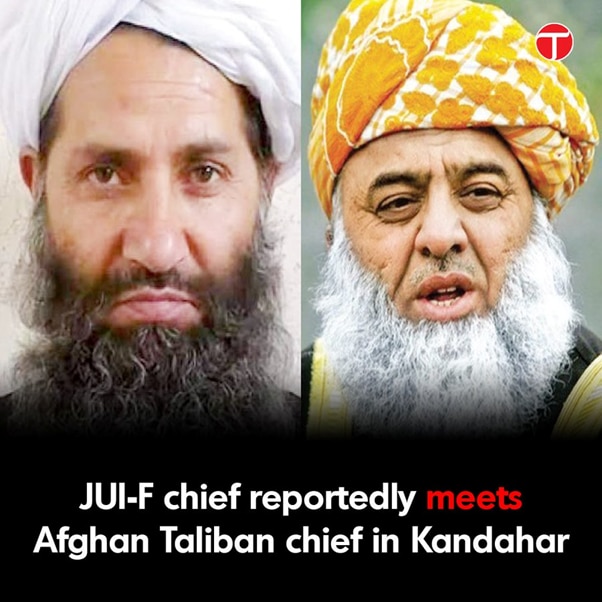
Maulana Fazlur Rehman (right) met with Mullah Hibbatullah Akhundzada on January 10
Maulana Fazlur Rehman's mediation is not the only effort to salvage Afghanistan-Pakistan relations, damaged mainly by the the Afghan Taliban's empowering of TTP's persistent attacks from its safe havens in Afghanistan. Both countries tried their best to resolve these issues, including an attempt to settle the family members of TTP's mujahideen in northern regions of Afghanistan, especially in Takhar and Badakhshan provinces.[59]
On January 8, a day after Maulana Fazlur Rehman arrived in Kabul, a terror attack on an anti-polio vaccination team in Mamond area of Bajaur tribal district in Pakistan, killed six police officers and wounded more than three dozen others.[60] Senior Pakistani journalist Kamran Yousaf published a report, saying that with the Bajaur terror attack, "hopes attached to Fazlur Rehman's visit to Kabul wither away."[61]
In its January 9, 2024 issue, Worazpanra Wahdat, a Pashtu-language Pakistani daily, raised questions as to whether the Afghan Taliban will be willing to show flexibility in their stance regarding handing over TTP leaders on the demand of Maulana Fazlur Rehman and added that the ground realities indicate the Taliban rulers have not agreed before nor are likely to agree after Fazlur Rehman's trip, to take steps against the TTP.[62] The other reason, the editorial noted, was the fear that thousands of TTP fighters may join the Islamic State (ISKP), thereby worsening the security situation in Afghanistan, along with Pakistan.[63]
It appears that Taliban-ruled Afghanistan and Pakistan will keep returning to war and peace in the coming years, and TTP Mufti Noor Wali Mehsid's sixth strategy of waging jihad against the Pakistani armed forces while simultaneously engaging in talks about peace, much like the Afghan Taliban did during the Doha process, will prevail. This is because the TTP's short-term goal, inspired by the IEA's victory over the U.S. forces, is to establish a mini emirate in Khyber Pakhtunkhwa. In December 2023, a report noted that the TTP "with the tacit support from the Afghan Taliban" was seeking "establish its own 'empire' within the former tribal areas" which are now absorbed into Khyber Pakhtunkhwa province.[64]
TTP's Vision Of Global Jihad
Purely for operational reasons, TTP's attacks are limited mostly to Khyber Pakhtunkhwa province. The IEA also had limited its operations to the territory of Afghanistan. But none of the jihadi groups believe in territorial nationalism. For them, as for the Islamic State and Al-Qaeda, the nation is the Ummah, the global community of Muslims with no territorial borders. It is for this reason, that the TTP's blueprint for a shari'a-governed mini emirate in Khyber Pakhtunkhwa is ready.
Therefore, the fifth strategy, adopted by TTP and mentioned above, is simply tactical and must be questioned for misleading the world by arguing that "Tehreek-e-Taliban Pakistan has no external and global agenda. Our holy war is against the treacherous and occupying forces of Pakistan."[65] This argument is deceptive because TTP's near-term goal is establishment of an emirate in Khyber Pakhtunkhwa region in full awareness of the fact that it took two decades for the Afghan Taliban to fight against the U.S. forces to realize this goal.
There are many statements issued by the TTP indicating that it believes in a long-term, ideological vision of global jihad against the non-Islamic world. As late as October 2023, TTP argued that the Jihad-e-Pakistan ("Jihad of Pakistan") being waged by the TTP mujahideen is a harbinger of something much larger in scale: "The jihad of Pakistan is from among the best of jihads and is an important jihad because with a victory over Pakistan, the path opens for the victory over the lands of India, Iran, China, and Bangladesh and the victory of these lands (India and Iran). The ray of victory on the land of Al-Quds [i.e., Jerusalem] is connected to this jihad [in Pakistan]."[66]
In May 2022, the TTP issued another statement in which it, criticizing Pakistani politics and Pakistan's role in counterterrorism in support of the U.S., said: "Pakistan has been used as a cantonment of the West for decades."[67] This statement was noticeable for another reason: It made clear that the TTP wants to raise the Afghan Taliban's white flag over Islamabad too, as is now done in Kabul. It urged Pakistanis: "The Tehreek-e-Taliban Pakistan (TTP) has been fighting them [the Pakistani politicians and military] for the last two decades. Therefore, instead of pinning [your] hopes on this democratic system, join us in utilizing all your energies for the IEA style of politics. The time is not far when, like Kabul, the white flag will be hoisted on Islamabad."[68]
* Tufail Ahmad is Senior Fellow for the MEMRI Islamism and Counter-Radicalization Initiative. Yigal Carmon is President of MEMRI.
[1] Roznama Ummat, the pro-military and pro-Taliban Urdu daily, ran the following headlines on its frontpage of August 16, 2021: "American Envoy Flees Kabul By Helicopter"; "Taliban Mujahideen Remove Occupation Of Afghanistan"; "Taliban Open Doors Of Bagram And Pul-I-Charkhi Prisons – All Prisoners Freed"; "Jubilant Welcome Of Taliban Mujahideen In Kabul"; and an advertisement carried a Quranic verse: "And say that the Truth came, and Falsehood was obliterated, without doubt Falsehood had to be abolished."
[2] Twitter.com/Channel4News, September 4, 2021.
[3] MEMRI JTTM Report, Pakistani Taliban Emir Mufti Noor Wali Mehsud Says TTP Is Branch Of The Islamic Emirate Of Afghanistan, Travels Through Pakistan's Border Regions, December 21, 2023.
[4] MEMRI Daily Brief No. 390, According To UN Report, Afghan Taliban Continue To Sponsor Al-Qaeda And Other Foreign Jihadi Organizations Such As Tehreek-e-Taliban Pakistan (TTP), Jaish-e-Muhammad (JeM), Lashkar-e-Taiba (LeT), And East Turkestan Islamic Movement (ETIM), June 17, 2022.
[5] MEMRI Daily Brief No. 492, UN Security Council Report Says Afghanistan's Taliban Rulers Have Appointed Al-Qaeda Commanders To Government Positions, Provide Them With Monthly Salaries, Training Camps, June 15, 2023.
[6] MEMRI Daily Brief No. 492, UN Security Council Report Says Afghanistan's Taliban Rulers Have Appointed Al-Qaeda Commanders To Government Positions, Provide Them With Monthly Salaries, Training Camps, June 15, 2023.
[7] MEMRI JTTM Report, Tehreek-e-Taliban Pakistan (TTP) Reports That It Killed 446 Pakistani Security Personnel, Injured 569 In 367 Attacks In 2022, January 9, 2023.
[8] MEMRI JTTM Report, Pakistani Security Analyst: December 2022 Was Deadliest Month In A Decade For Pakistan, Tehreek-e-Taliban Pakistan (TTP), Balochistan Liberation Army (BLA), ISIS-K Emerged As Major Threats: Afghan And Pakistani Talibans 'Have Been Boring Holes In The Border Fence That Pakistan Has Constructed At a Cost Of Over $500 Million', January 23, 2023.
[9] T.me/umpubeng_bot, December 30, 2023.
[10] T.me/umpubeng_bot, December 30, 2023.
[11] T.me/umpubeng_bot, December 30, 2023.
[12] Crss.pk (Pakistan), accessed January 9, 2024.
[13] Crss.pk (Pakistan), accessed January 9, 2024.
[14] MEMRI JTTM Report, Tehreek-e-Taliban Pakistan Appoints New Emir, June 25, 2018.
[15] MEMRI JTTM Report, In Article In Pakistani Daily, Security Analyst Muhammad Amir Rana Warns That Tehreek-e-Taliban Pakistan (TTP) 'Is Spreading Its Wings And Establishing New Chapters In The Country's Religiously And Ethnically Vulnerable Regions', June 11, 2023.
[16] MEMRI JTTM Report, In North Waziristan, Jihadi Group Led By Commander Yasir Dawar Joins Tehreek-e-Taliban Pakistan (TTP), Pledges Jihad, Migration, May 10, 2023.
[17] Also, Bajaur wilayah was merged into Malakand wilayah, and Khyber and Darra Adamkhel were merged into the Peshawar wilayah. MEMRI JTTM Report, Inspired By Afghan Taliban, Tehreek-e-Taliban Pakistan (TTP) Creates Administrative Structure, Names Pakistani Districts As Wilayats, Appoints Governors And Intelligence Chiefs, March 1, 2022.
[18] MEMRI JTTM Report, Inspired By Afghan Taliban, Tehreek-e-Taliban Pakistan (TTP) Creates Administrative Structure, Names Pakistani Districts As Wilayats, Appoints Governors And Intelligence Chiefs, March 1, 2022.
[19] MEMRI JTTM Report, In Article In Pakistani Daily, Security Analyst Muhammad Amir Rana Warns That Tehreek-e-Taliban Pakistan (TTP) 'Is Spreading Its Wings And Establishing New Chapters In The Country's Religiously And Ethnically Vulnerable Regions', June 11, 2023.
[20] MEMRI JTTM Report, In Article In Pakistani Daily, Security Analyst Muhammad Amir Rana Warns That Tehreek-e-Taliban Pakistan (TTP) 'Is Spreading Its Wings And Establishing New Chapters In The Country's Religiously And Ethnically Vulnerable Regions', June 11, 2023.
[21] MEMRI JTTM Report, Pakistani Militant Urge Muslim Youth To Replicate Benghazi: 'Just As They Assaulted And Destroyed The American Embassy, Destroy The Embassies Of Europe', August 21, 2013.
[22] MEMRI JTTM Report, Tehreek-e-Taliban Pakistan (TTP) Emir Mufti Noor Wali Mehsud Declares 12-Day Eid-ul-Fitr Ceasefire Against Pakistan Army, Says: 'Our Jihad Will Continue Until The Pakistani Army And Security Agencies Vacate Our Areas', May 2, 2022.
[23] UmarMedia.biz, September 28, 2023.
[24] UmarMedia.biz, September 28, 2023.
[25] MEMRI JTTM Report, Tehreek-e-Taliban Pakistan (TTP) Reiterates That Its Jihad Has No Agenda Outside Pakistan, Warns Pakistani Armed Forces: 'Thanks To The Ongoing Holy Jihad In Pakistan, This Impure Army Will Soon Be Defeated', February 14, 2023.
[26] MEMRI JTTM Report, In Doha, U.S.-Taliban Talks Appear Deadlocked As Taliban Spokesman Tweets That U.S. 'Should Forget About The Idea Of Us Putting Down Our Arms', May 6, 2019.
[27] ToloNews.com (Afghanistan), August 18, 2014.
[28] ToloNews.com (Afghanistan), February 19, 2017.
[29] Reuters.com, December 17, 2021.
[30] EconomicTimes.com (India), April 16, 2022.
[31] Sputniknews.in (India), July 28, 2023.
[32] MEMRI JTTM Report, Tehreek-e-Taliban Pakistan (TTP) Agrees To Month-Long Ceasefire With Pakistan Government To Facilitate Negotiations Being Mediated By Afghan Taliban, November 15, 2021.
[33] MEMRI JTTM Report, Tehreek-e-Taliban Pakistan (TTP) Agrees To Month-Long Ceasefire With Pakistan Government To Facilitate Negotiations Being Mediated By Afghan Taliban, November 15, 2021.
[34] MEMRI JTTM Report, After Interim Ceasefire, Tehreek-e-Taliban Pakistan (TTP) Accuses Pakistani Military Of Multiple Violations, Says It Is 'Not Possible To Continue With The Ceasefire', December 22, 2021.
[35] MEMRI JTTM Report, After Interim Ceasefire, Tehreek-e-Taliban Pakistan (TTP) Accuses Pakistani Military Of Multiple Violations, Says It Is 'Not Possible To Continue With The Ceasefire', December 22, 2021.
[36] MEMRI JTTM Report, After Interim Ceasefire, Tehreek-e-Taliban Pakistan (TTP) Accuses Pakistani Military Of Multiple Violations, Says It Is 'Not Possible To Continue With The Ceasefire', December 22, 2021.
[37] MEMRI JTTM Report, Tehreek-e-Taliban Pakistan (TTP) Emir Mufti Noor Wali Mehsud Says His Organization Will Not Surrender Weapons, Vows To Continue Jihad Against Pakistan, December 22, 2021.
[38] MEMRI JTTM Report, Tehreek-e-Taliban Pakistan (TTP) Emir Mufti Noor Wali Mehsud Says His Organization Will Not Surrender Weapons, Vows To Continue Jihad Against Pakistan, December 22, 2021.
[39] MEMRI JTTM Report, Tehreek-e-Taliban Pakistan (TTP) Emir Mufti Noor Wali Mehsud Says His Organization Will Not Surrender Weapons, Vows To Continue Jihad Against Pakistan, December 22, 2021.
[40] MEMRI JTTM Report, Learning From Afghan Taliban, Tehreek-e-Taliban Pakistan (TTP) Says It Is Ready To Simultaneously Negotiate With And Fight Pakistan Army, January 10, 2022.
[41] Dawn.com (Pakistan), July 13, 2023.
[42] Dawn.com (Pakistan), November 4, 2023.
[43] Aljazeera.com (Qatar), December 12, 2023; Dawn.com (Pakistan), December 17, 2023.
[44] MEMRI Daily Brief No. 540, Global Silence As Pakistan Orders Forcible Deportation Of 1.7 Million Afghan Refugees, November 14, 2023.
[45] MEMRI Daily Brief No. 494, The Taliban Government's Gender Barbarism In The Name Of Islam – Men Are Forcing Afghan Girls And Women Not To Read, Work, Speak, Or Sing, June 23, 2023.
[46] MEMRI Daily Brief No. 494, The Taliban Government's Gender Barbarism In The Name Of Islam – Men Are Forcing Afghan Girls And Women Not To Read, Work, Speak, Or Sing, June 23, 2023.
[47] MEMRI Daily Brief No. 494, The Taliban Government's Gender Barbarism In The Name Of Islam – Men Are Forcing Afghan Girls And Women Not To Read, Work, Speak, Or Sing, June 23, 2023.
[48] Twitter.com/MediaHamasa/status/1744653181882409234?s=20, January 9, 2024.
[49] Tolonews.com (Afghanistan), December 8, 2023.
[50] ShamshadNews.com (Afghanistan), November 29, 2023.
[51] ShamshadNews.com (Afghanistan), November 29, 2023.
[52] Tolonews.com (Afghanistan), December 10, 2023.
[53] Tolonews.com (Afghanistan), December 17, 2023.
[54] Roznama Express (Pakistan), January 9, 2024.
[55] Twitter.com/juipakofficial, January 7, 2024.
[56] Twitter.com/khorasandiary, January 11, 2024.
[57] Jang.com.pk (Pakistan), January 10, 2024.
[58] Twitter.com/TahirJourno, January 10, 2024.
[59] MEMRI Inquiry & Analysis Series No. 1700, Amid Chinese Diplomatic Push, Afghan Taliban Begin Settling Tehreek-e-Taliban Pakistan (TTP) Fighters In North Afghanistan, Prompting Fears That Waziristan-Style Jihadi Situation Could Emerge In Central Asia Along Afghan Border, June 21, 2023.
[60] Roznama Express (Pakistan), January 9, 2024.
[61] Roznama Express (Pakistan), January 10, 2024.
[62] Worazpanra Wahdat (Pakistan), January 9, 2024.
[63] Worazpanra Wahdat (Pakistan), January 9, 2024.
[64] Tribune.com.pk (Pakistan), December 28, 2023.
[65] MEMRI JTTM Report, Tehreek-e-Taliban Pakistan (TTP) Reiterates That Its Jihad Has No Agenda Outside Pakistan, Warns Pakistani Armed Forces: 'Thanks To The Ongoing Holy Jihad In Pakistan, This Impure Army Will Soon Be Defeated', February 14, 2023.
[66] MEMRI JTTM Report, In Issue 20 Of Urdu-Language Magazine 'Taliban,' Tehreek-e-Taliban Pakistan (TTP) Stresses That Victory Of 'The Jihad Of Pakistan' Will Lead To Jihadi Victories In India, Iran, And Syria, And Open Doors To Jerusalem Via Sea Route From South Asia, October 25, 2023.


